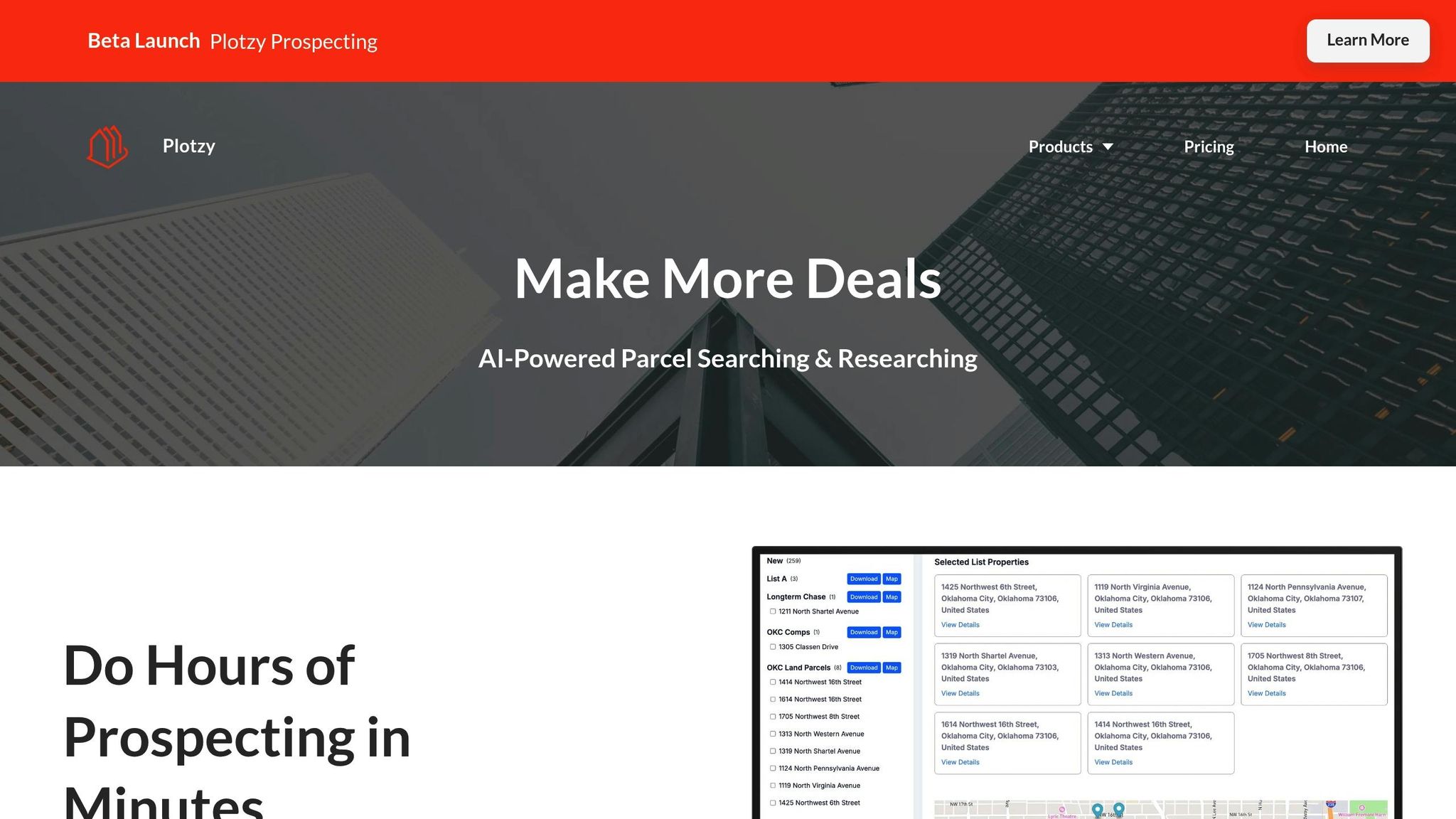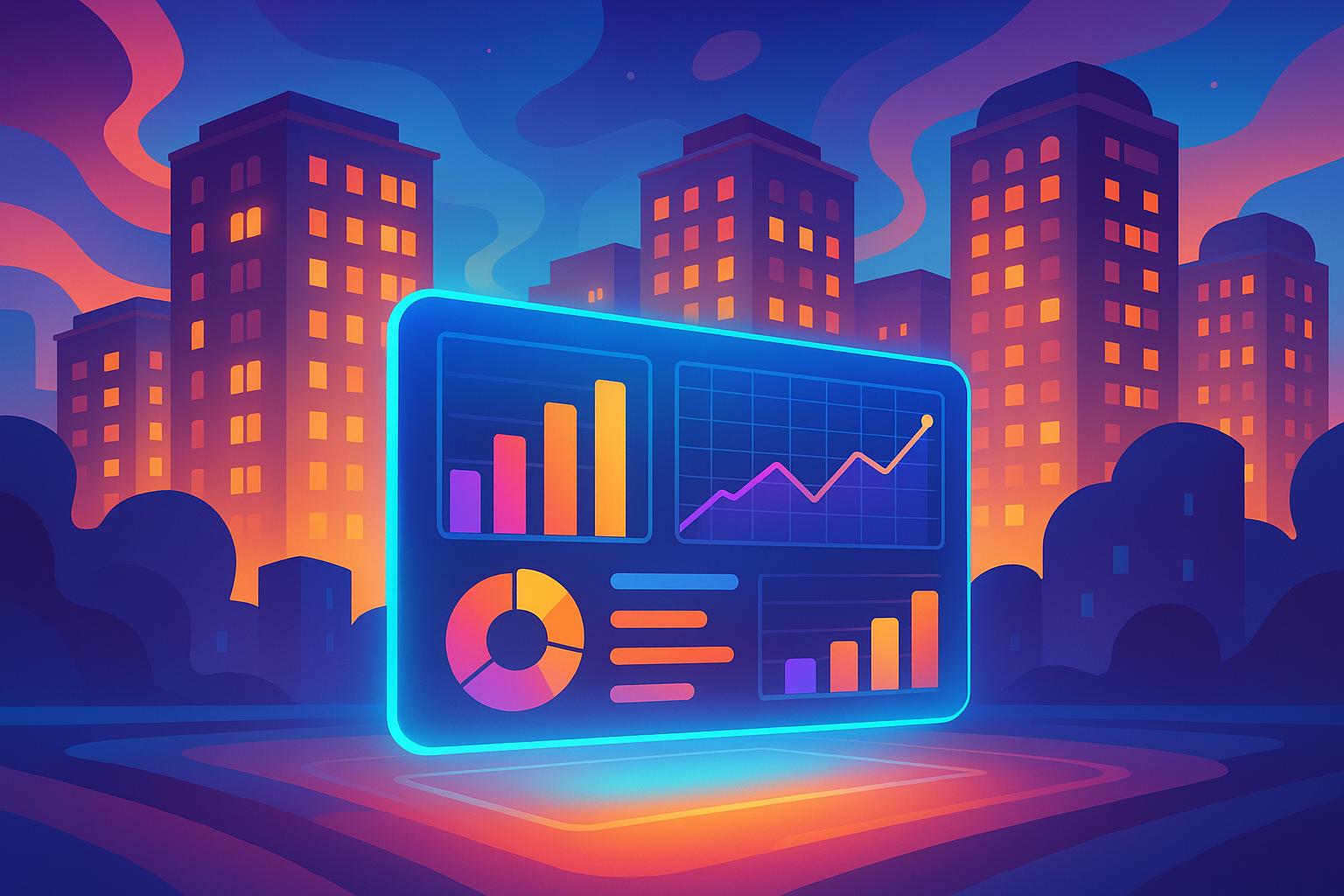The commercial real estate industry is transforming as artificial intelligence (AI) takes over tedious tasks like property research, zoning analysis, and deal sourcing. AI tools save time, reduce errors, and help professionals make faster decisions. With 77% of companies already using or testing AI and the potential to add $110-$180 billion in value, AI is reshaping how brokers, developers, and investors work.
Key takeaways:
- AI in real estate: Automates repetitive tasks like zoning research, property valuation, and due diligence.
- Market growth: The property tech market is projected to hit $32.2 billion by 2030.
- Tools like Plotzy: Centralize property data, streamline zoning research, and provide instant insights with plans starting at $65/month.
AI isn't replacing human expertise but acting as a "co-pilot", handling data-heavy tasks so professionals can focus on strategy and relationships. It's time to integrate AI into your workflow to stay competitive.
4 Ways to Use AI in Commercial Real Estate
Main Functions of a Real Estate Co-Pilot
An AI-powered real estate co-pilot is reshaping how professionals tackle time-intensive tasks. Instead of spending hours digging through scattered databases or outdated municipal websites, these systems simplify workflows - from initial research to closing deals. The key functions of these tools address some of the most pressing challenges in the real estate industry.
Automated Property Research
Traditional property research often involves sifting through multiple county websites and public records, which can be tedious and time-consuming. AI simplifies this by pulling data from various sources like county records, municipal databases, tax assessments, and historical sales data - all in one place. It doesn’t stop there. By analyzing recent sales, property characteristics, and location data, AI algorithms predict market trends and property values. They even uncover patterns hidden in economic and demographic information.
Machine learning adds another layer of sophistication, spotting correlations that human researchers might miss. This creates appraisals that are more objective and consistent. By combining data from sources like financial reports, social media, and news articles, these systems deliver a well-rounded view of the market - helping professionals make informed decisions faster.
Zoning Analysis and Compliance
Zoning research has long been one of the trickiest parts of commercial real estate. Municipal codes are often dense, websites outdated, and getting clear answers can take days. AI changes the game by instantly providing zoning details, such as permitted uses, setback requirements, height restrictions, and density limits. It even verifies compliance and speeds up variance approvals by offering real-time regulatory insights.
Take New York City, for instance. AI tools can assess variance requests using specific criteria - like ensuring adequate daylight penetration on streets - through frameworks such as the Daylight Evaluation in Midtown Manhattan. On top of that, AI helps professionals stay current with changing regulations by comparing new real estate laws against internal standards. This ensures compliance without the usual headaches.
Better Prospecting and Deal Sourcing
Once research and zoning tasks are streamlined, AI takes prospecting and deal sourcing to the next level. Predictive analytics help identify early market opportunities, while AI tools quickly retrieve key decision-makers’ contact information - cutting down on the need for endless cold calls. This makes it easier to spot and act on opportunities that might otherwise go unnoticed.
"Real estate agents who are not paying attention to AI are putting their livelihoods at risk. Powerful AI tools are already transforming residential real estate and forward-thinking agents are paying attention".
Plotzy's Features and Benefits for Real Estate Professionals

As previously mentioned, manual research and zoning delays often slow down real estate projects. Plotzy tackles these challenges by simplifying workflows for brokers, developers, and land acquisition teams. By bringing together diverse data sources and municipal details into one platform, Plotzy eliminates the bottlenecks that traditionally hinder deal-making. Here's a closer look at its standout features.
Centralized Data Hub for Streamlined Insights
Plotzy combines data from county websites, tax records, and municipal databases into a single, user-friendly interface. It consolidates property details, parcel boundaries, owner contact information, and zoning specifics, sparing professionals the frustration of navigating outdated government websites.
This centralized system allows users to filter parcels by permitted uses, generate detailed property reports, and export data for further analysis - all without switching platforms. Higher-tier plans even offer unlimited property searches, making it a practical solution for teams juggling multiple projects at once.
The platform's zoning layers and parcel filtering tools are particularly useful. Professionals can visualize properties based on specific criteria, with real-time updated, interactive maps that overlay zoning information and property boundaries. This eliminates the need to manually cross-reference zoning maps, saving valuable time and effort.
Advanced Retrieval-Augmented Generation (RAG) Technology
One of Plotzy's most powerful features is its use of Retrieval-Augmented Generation (RAG) technology, which provides instant, precise answers to complex zoning and development questions. This cutting-edge system pulls data directly from municipal codes and zoning ordinances, offering context-aware responses tailored to specific queries.
"By employing advanced techniques like Retrieval-Augmented Generation (RAG), Plotzy ensures that users receive precise, context-aware responses drawn from specific datasets, reducing the time spent searching for information and increasing confidence in decision-making."
- Plotzy
RAG technology, part of a market projected to reach USD 1,042.7 million in 2023, allows Plotzy to go beyond simple database searches. It delivers nuanced insights that would otherwise require hours of research or direct communication with municipal offices. Whether you're asking about zoning regulations or development constraints, the system provides thorough, up-to-date answers that account for local rules, recent changes, and exceptions.
Flexible Plans and Pricing
Plotzy offers two subscription tiers tailored to meet the needs of different professionals and team sizes. Both plans provide access to essential tools, but each is designed with specific use cases in mind.
| Feature | Basic Plan ($65/mo) | Pro Plan ($200/mo) |
|---|---|---|
| Property searches | Unlimited | Unlimited |
| Owner contact info matches | 200 per month | 1,000 per month |
| Property data & parcel boundaries | ✓ | ✓ |
| Data exports & property lists | ✓ | ✓ |
| Permitted use filters | ✓ | ✓ |
| Municipal resources | ✓ | ✓ |
| Instant zoning Q&As | ✗ | ✓ |
| Custom shapefiles | ✗ | ✓ |
The Basic plan, priced at $65 per month, is ideal for individual brokers or smaller operations. It includes unlimited property searches, access to municipal resources, and 200 owner contact matches per month - perfect for steady prospecting without overwhelming solo users.
The Pro plan, at $200 per month, is designed for larger teams and developers handling more complex projects. It includes 1,000 owner contact matches per month, instant zoning Q&A capabilities powered by RAG, and the ability to integrate custom shapefiles. This plan is essential for teams conducting detailed zoning research or managing multiple developments. Both plans ensure access to comprehensive property data and key tools, supporting efficient research and decision-making at any scale.
sbb-itb-11d231f
How to Use AI in Commercial Real Estate
AI has become an indispensable tool in commercial real estate, transforming how brokers, developers, and investors approach site selection, due diligence, and municipal research. By streamlining research and reducing manual workloads, AI empowers professionals to make quicker, well-informed decisions. Let’s dive into how it’s reshaping site selection and property filtering.
Site Selection and Parcel Filtering
AI has redefined site selection by processing massive datasets to pinpoint ideal locations based on specific criteria. Professionals can now filter parcels by zoning, permitted uses, acreage, and development potential in just minutes.
As one industry expert puts it:
"With the aid of modern technology, site selection has evolved from a subjective and labor-intensive task into a data-driven, analytical process that leverages vast amounts of information and sophisticated tools".
This shift allows developers to explore multiple scenarios and predict potential returns on investment with greater precision.
Take Plotzy’s parcel filtering capabilities as an example. This platform allows users to search for properties based on zoning and permitted uses, overlay zoning data on interactive maps, and identify parcels that meet specific development needs. By integrating data from county websites, tax records, and municipal databases, Plotzy eliminates the need to sift through multiple government portals, offering a more streamlined experience.
AI also brings predictive analysis into the mix. It can assess the potential for future growth by evaluating the availability of adjacent land or additional space.
"AI will assess the availability of additional space or adjacent land, as well as the potential for business growth in the area. A site that can accommodate a client's future needs can save you from the hassle of having to relocate in the later stages".
This forward-looking capability helps developers and investors maximize long-term value while avoiding costly relocations.
For retail and commercial projects, AI can analyze foot traffic patterns to minimize competition between locations and uncover synergies with co-tenants or strategic partners.
Due Diligence and Deal Flow Acceleration
AI has revolutionized the due diligence process, automating tasks that once took weeks of manual effort. From analyzing legal documents and contracts to reviewing environmental reports, AI systems compile detailed property profiles by cross-referencing multiple data sources.
Andrew Breeding, Senior GIS Programmer at Langan, highlights the impact:
"AI site selection leverages data-driven insights to streamline the real estate development process".
AI’s ability to process large datasets quickly ensures professionals can conduct thorough analyses more efficiently and cost-effectively than traditional methods. For example, Plotzy simplifies due diligence by offering instant access to property owner contact information and detailed profiles. Their Basic plan provides 200 owner matches per month, while the Pro plan offers 1,000 matches, allowing professionals to connect with property owners faster.
By cross-referencing multiple databases, AI also reduces human error, ensuring property details are accurate and current.
Municipal Research Made Simple
Navigating municipal zoning regulations has long been one of the most challenging aspects of commercial real estate development. AI simplifies this process by analyzing zoning codes and delivering instant answers to complex regulatory questions.
Plotzy’s Pro plan exemplifies this with its zoning Q&A feature powered by Retrieval-Augmented Generation (RAG) technology. This system pulls data directly from municipal codes and zoning ordinances, providing context-aware responses on zoning restrictions, permitted uses, and development requirements. Instead of spending hours combing through municipal websites or waiting for planning department responses, professionals can get immediate insights.
AI also aids in evaluating proposed buildings against performance standards, potentially speeding up variance approvals by reducing inconsistencies in regulatory interpretation.
On a broader scale, AI democratizes access to zoning data and planning insights. A recent study examining zoning codes across over 2,000 census-designated places in the U.S. found that form-based codes often lead to denser, more walkable urban areas, with higher floor area ratios and narrower setbacks. This kind of large-scale analysis helps professionals benchmark zoning codes, identify trends, and make informed decisions about development strategies.
Why Choose an AI Co-Pilot for Real Estate Operations?
The commercial real estate landscape is shifting rapidly as AI takes center stage in areas like research, deal sourcing, and market analysis. The challenge now is integrating AI seamlessly into existing workflows to keep pace with the industry's evolution.
Manual vs. AI-Assisted Workflows
Traditional real estate workflows often demand hours of tedious tasks - digging through databases, making calls to municipal offices, and manually entering data. AI co-pilots, on the other hand, simplify these processes, cutting down work that could take hours or even days to mere minutes.
| Aspect | Manual Workflow | AI-Assisted Workflow |
|---|---|---|
| Time Investment | 10–20 hours per week on research | Research completed in minutes, saving hours |
| Data Accuracy | Prone to human error and outdated information | Real-time data with cross-referenced validation |
| Cost Efficiency | High labor costs and slower deal cycles | Lower costs and faster deal cycles |
| Market Analysis | Limited scope and subjective assessments | Data-driven and comprehensive analysis |
| Owner Contact Research | Time-consuming searches through public records | Instant access to verified contact information |
This comparison underscores how AI eliminates repetitive tasks, enabling faster, more accurate operations.
Research shows that AI tools can save brokers between 10 and 20 hours per week, depending on the extent of their integration into workflows. This time savings directly translates into greater deal capacity and increased revenue potential.
Laura Barr, Americas retail leader for CBRE Advisory and Transaction Services, highlights the value of AI in freeing up brokers for high-impact activities:
"It's freeing up more of a broker's time to do the most important part of their job, which is the consultative and advisory piece".
Real-world examples illustrate this impact. JLL, for instance, uses AI to process lease contracts, cutting processing time by 30%. Similarly, CBRE's predictive maintenance tools, powered by AI, have reduced maintenance costs by 15% and extended equipment lifespan by 20%.
Speed is critical in a competitive market. Tanner Olson, managing partner at Legend Partners, emphasizes this point:
"Real estate ultimately is a game of speed. Time kills all deals, so just the ability to expedite deals … is always going to be beneficial".
While AI accelerates workflows, it also raises important considerations around data privacy and compliance.
Data Privacy and Compliance
Managing data responsibly is a top priority as AI adoption grows, particularly with increasing state-specific regulations and mandatory privacy risk assessments. A 2019 data breach at a real estate software provider, which exposed millions of tenant records - including sensitive information like Social Security numbers and bank account details - demonstrates the potential risks. This incident underscores the need for strong data governance frameworks when handling sensitive real estate data.
Leading AI co-pilots address these challenges using privacy-enhancing technologies such as encryption, anonymization, and differential privacy. They also provide opt-out options for automated decision-making to remain compliant with fair housing laws and anti-discrimination regulations.
Yao Morin, Chief Technology Officer at JLLT, sees these challenges as opportunities for progress:
"Potential risks in leveraging AI for real estate serve as opportunities for innovation".
Transparency is key. AI systems must clearly communicate how data is collected, used, and stored, while empowering users with control over their information. This approach helps build trust and ensures compliance with evolving regulatory standards.
Fit for U.S. Market Operations
AI tools tailored to U.S. market needs go beyond efficiency - they deliver localized insights critical for navigating the complexities of American real estate. From imperial measurements to dollar pricing and local zoning terminology, these tools are designed to align with U.S. conventions and practices.
The intricacies of local jurisdiction and zoning codes demand AI solutions specifically built for the U.S. market. For example, Plotzy offers a U.S.-focused platform that enhances real estate intelligence. Its Basic plan, priced at $65 per month, includes 200 owner matches, while the Pro plan at $200 per month provides unlimited property searches and instant zoning answers. These features are powered by advanced AI designed to interpret U.S. zoning regulations and development standards.
For small and medium-sized businesses, AI co-pilots level the playing field, enabling smarter, data-driven decisions and improved client services. These tools help professionals navigate the nuances of American real estate, from lease agreements to development timelines, ultimately delivering more accurate insights and recommendations.
Conclusion and Key Takeaways
Commercial real estate is at a turning point. With 77% of companies already using or exploring artificial intelligence and 83% identifying it as a top business priority, the real question isn't whether to adopt AI - it's how quickly you can integrate it into your workflow. The payoff? Tangible financial gains and a competitive edge.
Take AI tools like Plotzy, for example. These co-pilots can boost returns by 23% and help professionals identify opportunities 2.7 times faster than traditional methods. This speed advantage isn't just a convenience - it’s a game-changer. While traditional market analysis might take weeks, AI can process massive datasets in mere minutes, enabling quicker decisions when timing is critical. Faster decisions mean capturing opportunities that slower competitors might never even see.
AI’s benefits go beyond speed. Predictive maintenance powered by AI can lower maintenance costs by 15–20%, while brokers, developers, and investors benefit from streamlined research, zoning, and prospecting processes. Over time, these efficiencies compound to drive sustained growth.
The potential market impact is massive. AI could unlock $110 billion to $180 billion in value for the real estate sector, with the global AI real estate market expected to hit $41.5 billion by 2033. Early adopters stand to gain a lasting competitive edge.
To make the most of AI, start strategically. Focus on areas like property valuation, lead generation, or zoning research. Gradual implementation ensures smoother adaptation, and ongoing training will keep your team ahead of the curve. By embracing these tools now, you position yourself to lead in an industry that’s evolving rapidly.
Ultimately, those who integrate AI today will help shape the future of commercial real estate. Waiting too long? That’s a risk no one can afford in a market that’s becoming more competitive by the day.
FAQs
How does AI improve zoning analysis and ensure compliance in commercial real estate?
AI has made zoning analysis and compliance in commercial real estate much easier by automatically aligning property details with local zoning laws, building codes, and other regulations. This approach not only cuts down on errors but also saves time, ensuring properties meet all legal requirements.
Additionally, it can spot potential rezoning risks by examining municipal policies and urban planning proposals. By simplifying these tasks, AI helps brokers, developers, and investors handle regulatory challenges more efficiently and with less hassle.
How can AI tools like Plotzy help with property research and finding deals in real estate?
AI tools such as Plotzy bring a new level of efficiency to property research and deal sourcing in the U.S. real estate market. By automating tasks like zoning analysis, evaluating market trends, and qualifying leads, they take the complexity out of time-consuming processes, freeing up hours for other priorities.
With features like Automated Valuation Models (AVMs), these tools deliver precise property assessments, making it easier to spot profitable off-market opportunities in no time. On top of that, they provide easy access to zoning maps and property owner contact details, empowering brokers, developers, and investors to make quicker, more informed decisions.
How can real estate professionals protect data privacy and stay compliant when using AI tools?
To protect data privacy and stay compliant, real estate professionals should focus on privacy-first practices by embedding security measures directly into AI systems during development. It's equally important to keep an eye on AI processes and stay informed about privacy regulations like the California Consumer Privacy Act (CCPA).
Leveraging AI tools with features such as automated data redaction and strong data governance can safeguard sensitive information while simplifying compliance efforts. Staying ahead of changing legal standards helps ensure data security and promotes responsible AI use.


